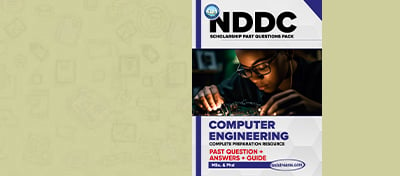NDDC Scholarship Computer Engineering Past Questions And Answers [Free – Download]
Are you a tech with big dreams pursuing higher studies in Computer Engineering? The NNDC Scholarship is your chance to make those dreams a reality, and we’re here to help you achieve academic excellence!
The NNDC Scholarship is not just financial support; it’s a prestigious recognition of your potential as a future Computer Engineer. Embrace this opportunity to showcase your skills, innovation, and passion for technology.
To ace any scholarship exam, preparation is key, and our NNDC Scholarship Computer Engineering Past Questions and Answers are your ultimate study companion. These carefully curated materials provide valuable insights into the exam’s structure, question formats, and crucial topics.
With our Past Questions and Answers, you can refine your problem-solving abilities, deepen your understanding of core concepts, and gain the confidence to tackle any challenge with ease. Stand out as a standout candidate and leave a lasting impression on the scholarship committee
What Makes Our NDDC Scholarship Past Questions Stand Out?
- Comprehensive Coverage: Our collection spans multiple years, ensuring that you’re well-prepared for any surprises the exam might throw your way.
- Detailed Answers: Each question is accompanied by a comprehensive answer guide, allowing you to learn from your mistakes and reinforce your knowledge.
- Exam-Relevant Content: Our team of experts has painstakingly compiled the most relevant topics and questions that align with the NDDC Scholarship exam syllabus.
About NDDC Scholarship Test Style and Format (Updated)
NDDC overseas scholarship test was conducted by Cinfores-Ltd, between 2010 and 2015. Since 2016, the tests are now conducted by MEIL (MARG Educational International Limited).
The test usually comprises of 2 sections –
1. General questions which everyone will have to sit, and
2. Discipline-based questions.
For example, candidates in Engineering and Science related disciplines could take a mix of science-based questions like maths, English, physics, and chemistry for part 1, then discipline-specific questions for part 2.
2016 and 2017 tests contained more discipline-specific tests and English language tests as general papers. The test usually lasts between 30 to 60 minutes.
Sample Past Questions for NDDC Scholarship Aptitude Test – for COMPUTER ENGINEERING candidates
PHYSICS
1. What is the acceleration due to gravity on Earth’s surface approximately?
a) 9.8 m/s²
b) 6.3 m/s²
c) 5.0 m/s²
d) 7.2 m/s²
Answer: a) 9.8 m/s²
2. What is the SI unit of electric current?
a) Ampere
b) Volt
c) Ohm
d) Watt
Answer: a) Ampere
3. The energy stored in a stretched spring is an example of:
a) Kinetic energy
b) Potential energy
c) Mechanical energy
d) Thermal energy
Answer: b) Potential energy
4. Which law of thermodynamics states that heat flows from hotter to colder objects and that energy cannot be completely converted into work without some energy loss?
a) First law of thermodynamics
b) Second law of thermodynamics
c) Third law of thermodynamics
d) Zeroth law of thermodynamics
Answer: b) Second law of thermodynamics
5. The process of a gas transforming into a liquid is known as:
a) Sublimation
b) Condensation
c) Evaporation
d) Fusion
Answer: b) Condensation
6. Which type of waves are used in radar and microwave ovens?
a) Infrared waves
b) Radio waves
c) Ultraviolet waves
d) X-rays
Answer: b) Radio waves
7. What is the phenomenon where a wave bounces off a surface and changes direction?
a) Diffraction
b) Refraction
c) Reflection
d) Interference
Answer: c) Reflection
8. The process of nuclear fusion is the primary source of energy in:
a) The Sun
b) The Moon
c) Earth’s core
d) The stars
Answer: a) The Sun
9. An object submerged in a fluid experiences an upward buoyant force equal to the weight of the fluid displaced. This statement is known as:
a) Newton’s First Law
b) Archimedes’ Principle
c) Boyle’s Law
d) Hooke’s Law
Answer: b) Archimedes’ Principle
10. Which fundamental force is responsible for holding electrons in orbit around the nucleus in an atom?
a) Gravitational force
b) Weak nuclear force
c) Electromagnetic force
d) Strong nuclear force
Answer: c) Electromagnetic force
CHEMIATRY
1. What is the chemical symbol for the element oxygen?
a) O
b) Ox
c) Oxg
d) Oxn
Answer: a) O
2. Which of the following is a noble gas?
a) Hydrogen (H)
b) Helium (He)
c) Nitrogen (N)
d) Oxygen (O)
Answer: b) Helium (He)
3. The pH scale measures the acidity or basicity of a solution. A pH value of 7 indicates:
a) A neutral solution
b) An acidic solution
c) A basic solution
d) A saturated solution
Answer: a) A neutral solution
4. Which gas is the most abundant in Earth’s atmosphere?
a) Nitrogen (N2)
b) Oxygen (O2)
c) Carbon dioxide (CO2)
d) Argon (Ar)
Answer: a) Nitrogen (N2)
5. What is the chemical formula for water?
a) H2O2
b) CO2
c) H2O
d) O2H
Answer: c) H2O
6. The process of a substance changing from a gas directly to a solid without passing through the liquid state is called:
a) Evaporation
b) Sublimation
c) Condensation
d) Solidification
Answer: b) Sublimation
7. Which of the following elements is a metal?
a) Chlorine (Cl)
b) Sulfur (S)
c) Iron (Fe)
d) Phosphorus (P)
Answer: c) Iron (Fe)
8. Which type of chemical bond involves the sharing of electrons between atoms?
a) Ionic bond
b) Covalent bond
c) Metallic bond
d) Hydrogen bond
Answer: b) Covalent bond
9. What is the chemical formula for methane?
a) CH3OH
b) CO2
c) CH4
d) H2O
Answer: c) CH4
10. The process of a liquid changing into a gas at the surface of the liquid is known as:
a) Sublimation
b) Condensation
c) Evaporation
d) Fusion
Answer: c) Evaporation

Other Related Packs
PRODUCTION ENGINEERING.
PETROLEUM ENGINEERING
ELECTRICAL ENGINEERING
AGRICULTURAL ECONOMICS
CIVIL ENGINEERING
MECHANICAL ENGINEERING
ENVIRONMENTAL SCIENCE
MEDICAL SCIENCE
MANAGEMENT SCIENCE
EDUCATION AND HUMANITIES.
FISHERIES
GEOLOGY.
JOURNALISM
CHEMISTRY
CHEMICAL ENGINEERING.
BIOLOGY
COMPUTER ENGINEERING




